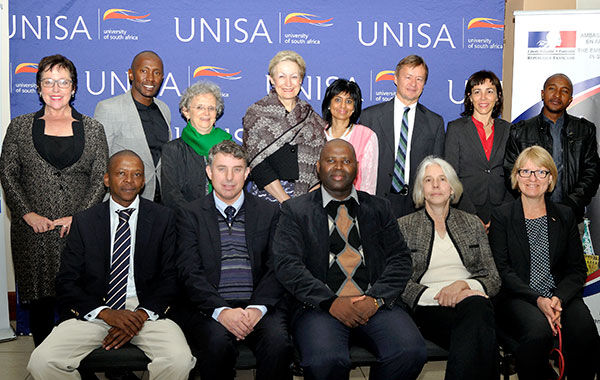 News
News 
Environment
Journée de la diplomatie environnementale à UNISA
In the build-up to the United Nations Framework Convention on Climate Change (UNFCCC) Conference of Parties (COP) 21, Unisa, in collaboration with the diplomatic missions of the European Union (EU), France, Germany, UK, Denmark and the US hosted a climate diplomacy day on 17 June 2015.
The event included keynote addresses and a panel discussion on COP21 and related climate change issues of the 21st century, which present risks to international prosperity and security for Africa and the world over.
COP21, to be held from 30 November to 11 December in Paris, France, will, among others, for the first time in over 20 years of UN negotiations, aim to achieve a legally binding and universal agreement on climate, with the aim of keeping global warming below 2°C.
Ambassador of France to South Africa, HE Elisabeth Barbier, said it is very important to reach an agreement in Paris because the results will affect the way we live in the 21st century. She said one of France’s missions as the presidency of COP21 is to listen to its friends, colleagues and partners. “We are working with all countries transparently to set out a collective ambition, address expectations of all countries, particularly the most vulnerable and reach the compromises which will enable us to achieve a consensus in Paris.”
All countries, she said, want to reach a universal consensus at COP21 but in order to do that, they need to work together. “This agreement must universal and legally binding, it must be ambitious, and it must enable us to limit the temperature rise to less than 2°C. In order to make sure that we are on the right track, all countries will submit their contributions before.”
Barbier added that while climate change affects us all, it does not affect everyone in the same way. “Therefore this agreement must reflect this diversity. It must be balanced between mitigation and adaptation in order to take into account the different realities of climate change. It should also reflect the needs of certain countries, such as the least developed countries…In order to build a true, universal, and legitimate framework, we need to take into account the variety of opinions and priorities. And most of all, we need to do it together.”
- Download Ambassador Barbier’s speech.
- Read The Times’ news report.



Comments
You must be logged in to leave a comment. Log in